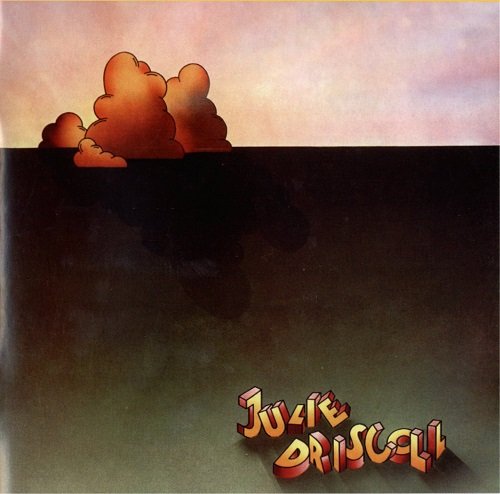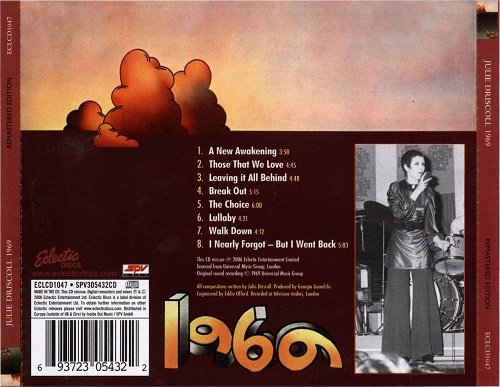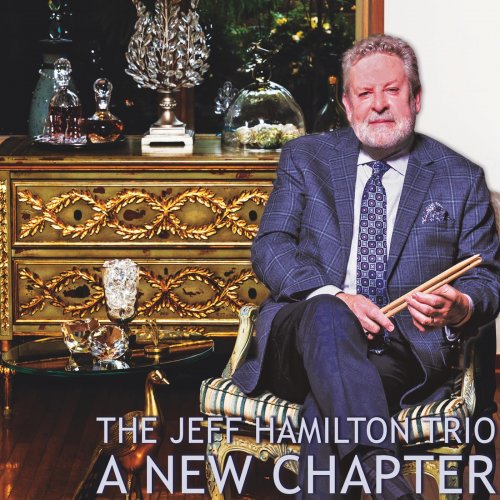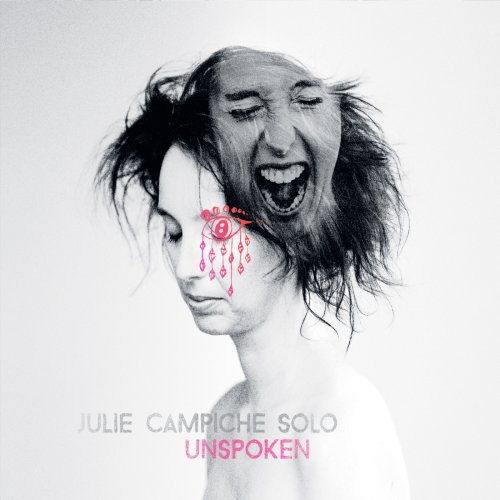Julie Driscoll - 1969 (Reissue, Remastered) (1971/2006)

Artist: Julie Driscoll
Title: 1969
Year Of Release: 1971/2006
Label: Eclectic Discs/SPV
Genre: Psychedelic Rock, Prog Folk, Jazz Rock, Folk Rock
Quality: Mp3 320 / Flac (tracks, .cue, log)
Total Time: 38:10
Total Size: 120/252 Mb (scans)
WebSite: Album Preview
Title: 1969
Year Of Release: 1971/2006
Label: Eclectic Discs/SPV
Genre: Psychedelic Rock, Prog Folk, Jazz Rock, Folk Rock
Quality: Mp3 320 / Flac (tracks, .cue, log)
Total Time: 38:10
Total Size: 120/252 Mb (scans)
WebSite: Album Preview

Tracklist:
1. A New Awakening - 3:50
2. Those That We Love - 4:48
3. Leaving It All Behind - 4:50
4. Break-Out - 5:22
5. The Choice - 5:59
6. Lullaby - 4:22
7. Walk Down - 4:15
8. I Nearly Forgot – But I Went Back - 5:10
Line-up::
Julie Driscoll - Vocal, Acoustic Guitar
Mark Charig - Cornet
Chris Spedding - Electric Guitar, Bass Guitar
Jeff Clyne - Bass, Arco Bass
Elton Dean - Alto
Nick Evans - Trombone
Keith Tippett - Piano, Celeste
Trevor Tompkins - Drums
Carl Jenkins - Oboe
Bud Parkes - Trumpet
Stan Salzman - Alto
Derek Wadsworth - Trombone
Brian Goding - Additional Vocals, Electric Guitar
Brian Belshaw - Additional Vocals, Bass Guitar
Jim Creegan - Electric Guitar
Barry Reeves - Drums
Bob Downes - Flute
Julie Driscoll's (now Tippetts) first move away from the blues-oriented pop of the Brian Auger band turned out to be this prophetic slab of wax that revealed her penchant to transcend the trappings of rock and pop for something more adventurous. To this end, Driscoll employed the help of many of the Canterbury scene's best-known musicians, including Carl Jenkins, Elton Dean, future husband Keith Tippetts, and guitarist Chris Spedding. The set opens with what would become an anthem for Driscoll, the horn-laden rocker "A New Awakening," in which she details the benefits of the search for new ground emotionally and mentally. In addition, with its knotty, arpeggio-laden horn lines and angular arrangement by Tippetts that puts the track on the left side of the standard rock and pop fence. "Those That We Love," a simple acoustic tune with Driscoll on acoustic guitar and Tippetts on piano and celeste with Jeff Clyne on bass is a striking treatise on how much we hurt the ones we love the most, and how those who love us forget us most. Beautifully textured vocal lines open up all over the body of the tune, soaring into darkened corners and illuminating them. One of the most striking things about this slab is how the listener can hear Driscoll's voice begin to open up to the possibilities of life after pop, that there was an entire universe waiting to be explored in song, nuance, and technique. The band provides not only sympathetic, but inspired support in her stead. Other notables here include the guitar freakout orgy of "Break-Out," the chamber/salon song of "The Choice," and the jazzed out balladry (in Canterbury style) of "Leaving It All Behind." Despite its age, 1969 holds up shockingly well, and is still very forward thinking in its musical approaches. Driscoll's/Tippetts' rugged, open-heart emotionalism is truly transcendent here, and this aspect of her wonderful voice has aged not one bit in over 30 years.
![Meinild/Anderskov/Tom - Spectral Entanglements (2023) [Hi-Res] Meinild/Anderskov/Tom - Spectral Entanglements (2023) [Hi-Res]](https://www.dibpic.com/uploads/posts/2026-02/1771491474_hl116k2q9n24a_600.jpg)
![The Messthetics & James Brandon Lewis - Deface The Currency (2026) [Hi-Res] The Messthetics & James Brandon Lewis - Deface The Currency (2026) [Hi-Res]](https://www.dibpic.com/uploads/posts/2026-02/1771424652_1.jpg)
![Tom Oren - Dark Lights (2026) [Hi-Res] Tom Oren - Dark Lights (2026) [Hi-Res]](https://www.dibpic.com/uploads/posts/2026-02/1771427884_tdqtmzk78zgcb_600.jpg)



![The Three Seas - Antaḥkaraṇa (2026) [Hi-Res] The Three Seas - Antaḥkaraṇa (2026) [Hi-Res]](https://img.israbox.com/img/2026-02/19/uhghtg21m4gkq8nt8lyl1f5dq.jpg)
![Meg Okura - Isaiah (2026) [Hi-Res] Meg Okura - Isaiah (2026) [Hi-Res]](https://www.dibpic.com/uploads/posts/2026-02/1771428622_a0886412943_10.jpg)
![Anna Kolchina - Reach for Tomorrow (2026) [Hi-Res] Anna Kolchina - Reach for Tomorrow (2026) [Hi-Res]](https://img.israbox.com/img/2026-02/19/quc4em3qn6fgke1rwewkbdxg5.jpg)